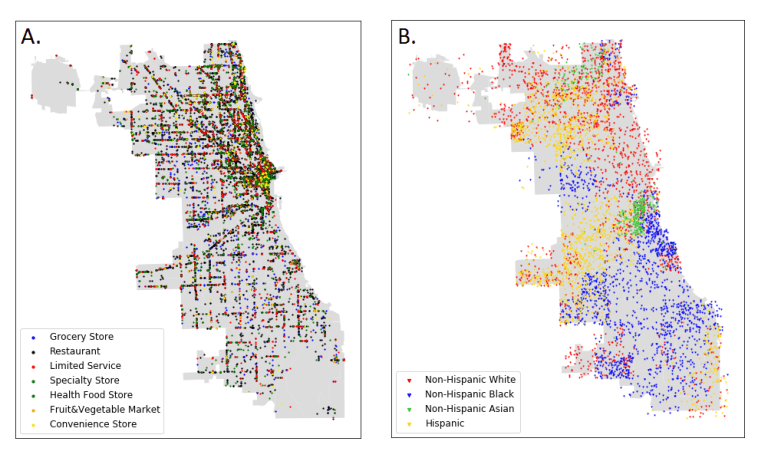Understanding Health in Context: The Center for Epidemiology and Population Health

Epidemiologists at Northwestern form a vital pillar in public health, identifying trends amid the seas of shifting health data. (Adobe Stock Images)
By Amand Dee
July, 2 2024
Social determinants — the conditions in which a person lives — are increasingly recognized as major influences on human health. That context, including the social and physical environment, is the lifeblood of epidemiology, a field dedicated to understanding the patterns, causes, and effects of health and disease across populations.
Northwestern University’s Center for Epidemiology and Population Health (CEPH) is a leader in that work, advancing population health interventions and improving outcomes worldwide. Using innovations in data analytics and precision medicine, CEPH researchers are focused on unraveling the intricate web of genetic predispositions, lifestyle factors, and environmental influences that shape individual health trajectories.
“These problems are complex,” said Norrina Allen, PhD, MPH , Quentin D. Young Professor of Health Policy and director of CEPH. “We have to do a lot of work on multiple levels, not just in the clinical setting, but going into communities, working with neighborhoods and speaking with families.”

We have to do a lot of work on multiple levels, not just in the clinical setting, but going into communities, working with neighborhoods and speaking with families.”
CEPH serves as a resource for investigators who are developing new, data-driven ways of answering critical questions to prevent and treat disease. One of the Institute for Public Health and Medicine’s inaugural centers, CEPH has been bridging population health research across departments and units at Feinberg School of Medicine since it relaunched in 2020. To guide the center’s multi-level approach, CEPH members bring years of expertise spanning disciplines, from medicine and public health to engineering and informatics.
Data Across the Lifespan
The Center for Epidemiology and Population Health has expertise in conducting research across the lifespan from work in young children to promote cardiovascular and mental health through work in older adults to prevent dementia.
One such study is the Early Intervention to Promote Cardiovascular Health of Mothers and Children (ENRICH) program, sponsored by the National Heart Lung and Blood Institute.
Northwestern is one of seven participating institutions examining the effectiveness of a home-based intervention on cardiovascular health and risk factors, including low socio-economic status and residence in low-resource communities, over two generations.
Another study is the Young Hearts study which is currently mapping cardiovascular health trajectories from birth through young adulthood. The Young Hearts study is a collaboration with health systems across Chicago led by NU CEPH researchers and has currently enrolled over 6,500 children.
Both these studies underscore the question that runs through nearly all the center’s work, according to Allen: “How do we intervene early to prevent the onset of disease and to promote health equity?”
Innovative Data Resources
Allen is also the director of the Innovative Data Resources research program at CEPH, which links data from diverse sources, such as public records, electronic medical records and social media.
The CEPH projects she leads rely on multiple data sources, whether they’re cohorts or data repositories.
As she looks to the future of population health, she sees more widespread use of multiple data sources. Connecting these sources, she thinks, will be key to understanding how neighborhood, environment, health and policies are influencing health and wellbeing.

A figure from the "Systems Science Approaches to Racial/Ethnic Disparities in Obesity" project, comparing the location of different food options with the local demographic makeup.
Multi-Study Pooling Projects
Over the years, as more data and methods for analyzing that data have become available, longitudinal studies have become more commonplace. These long-term studies can provide unmatched insights into health and aging.
Led by John Wilkins, MD, an associate professor of Medicine and Preventive Medicine, the Multi-Study Pooling Projects research program guides investigators who want to incorporate data pooling or identify existing data sets for their scientific inquiries.
A model for data approaches the program aims to promote institution-wide is the The Cardiovascular Disease Lifetime Risk Pooling Project. The project comprises a data set from 20 U.S.-based cohort studies, expanding the potential of research possible from a single study. From this data, studies have examined and predicted risk of diseases such as cancer.
Social Environment & Health
“Things like structural racism, access to healthy foods and stress are all believed to be important drivers of health,” explained Social Environment and Health program director Kiarri Kershaw, PhD, MPH, “but they are hard constructs to measure, especially at a population level.”

Structural racism, access to healthy foods and stress are all believed to be important drivers of health, but they are hard to measure, especially at a population level.”
Investigators can find models and support for this kind of research through Kershaw’s program. Her team employs a number of novel strategies to more accurately capture and understand people’s lived experiences. Leveraging publicly and commercially available data sets, for example, her team has mapped supermarkets, fast food restaurants, parks and crime. They have used Google Street View images to measure physical disorder, such as litter and graffiti, and neighborhood amenities, including benches at bus stops and murals. Currently, the program is measuring stress responses in natural settings through smartphone-based surveys and continuous heart monitoring.
Kershaw has also linked neighborhood-level data to patient addresses in the Enterprise Data Warehouse (EDW) and cohort study participants for investigators across the medical school and at other universities. Recently, Kershaw and Holistic Birth Collective, a Black-led nonprofit in Chicago that addresses maternal health inequities, received an Alliance for Research in Chicagoland Communities (ARCC) seed grant to develop a research partnership.
Affirming the broader importance of Kershaw’s research area, racial disparities and maternal health were among the most urgent issues discussed by population health leaders from across the state at the Population Health Forum, hosted by the Institute for Public Health and Medicine in April.
“The take-home message of the forum is that we want to have an impact,” Allen said, “that all of this work should involve and be communicated and translated back into the community to make sure that the work we do in the research field really is improving the outcomes of community members.”
Similarly at Northwestern, Allen urges investigators to consult the center as a resource not only in conducting rigorous science but in considering the contextual and social determinants that impact all health outcomes.
Get involved with or learn more about the Center for Epidemiology & Population Health.